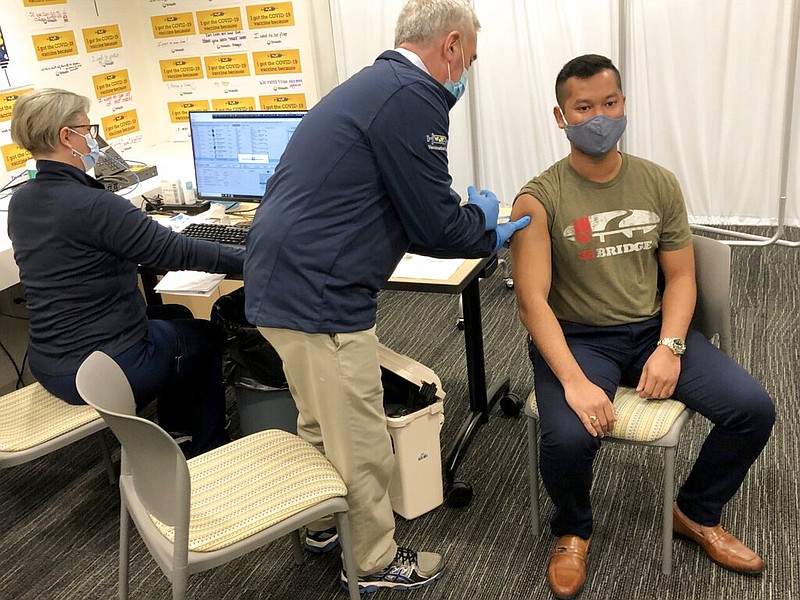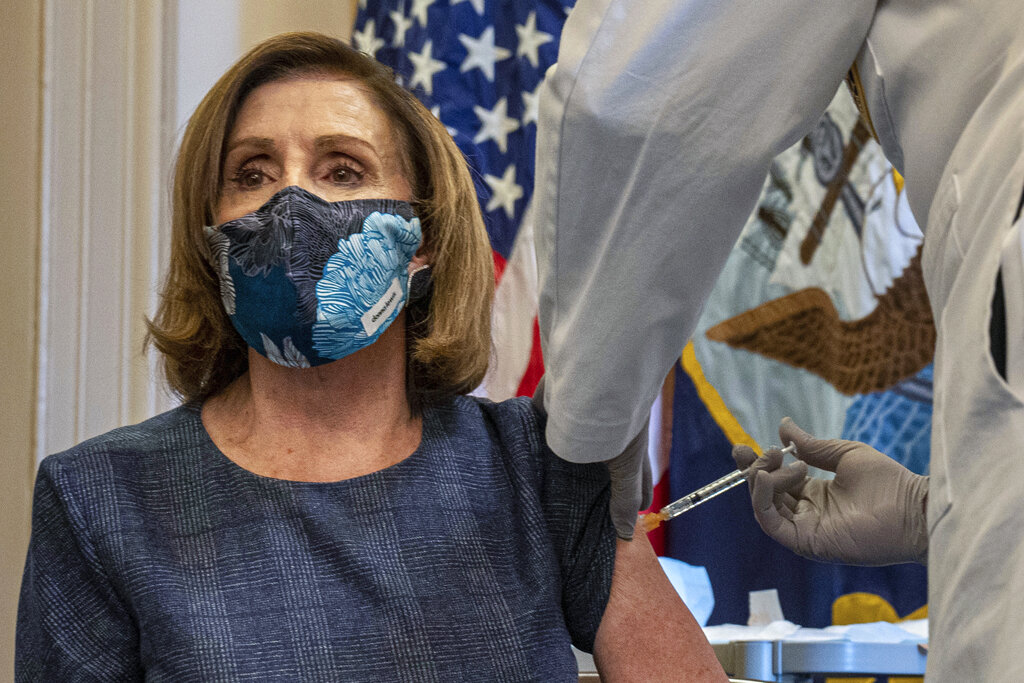WASHINGTON - Members of Congress were among the first people in the U.S. to have access to the sought-after COVID-19 vaccine when the initial doses became available in December.
Three months later, States Newsroom surveyed lawmakers representing the 22 states covered by its network of news outlets, including in Tennessee and Georgia.
Out of more than 200 surveyed, at least 155 lawmakers have been vaccinated. That figure includes 100 Democrats, 54 Republicans and one independent. U.S. Rep. Scott Desjarlais, R-South Pittsburg, has been vaccinated, as have both of Tennessee's U.S. senators, the survey found.
Fourteen lawmakers say they have not been vaccinated, either because they have been waiting to do so or because they don't plan to at all. All but one are Republicans.
Northwest Georgia's U.S. Rep. Marjorie Taylor Greene, R-Rome, has not been vaccinated.
"She is a perfectly healthy woman and doesn't see a reason to do so," said Greene's spokesperson, Nick Dyer.
The remaining lawmakers surveyed declined to share, or did not respond to questions about, their vaccination status.
Those included U.S. Rep. Chuck Fleischmann, R-Ooltewah. He did not respond to the States Newsroom survey, but he told the Times Free Press on Wednesday in a follow-up inquiry, "Because I was diagnosed with COVID-19 in January, I am waiting to be vaccinated until those who are at a greater risk for the virus are able to be vaccinated first. I continue to strongly urge all Americans to get vaccinated."
The race to inoculate the nation has become even more urgent in recent days as states loosen mask and social distancing requirements and infections in some places rise.
"Our work is far from over," President Joe Biden warned on Monday. "The war against COVID-19 is far from won. This is deadly serious."
There's no definitive public tally of how many lawmakers have rolled up their sleeves for a shot: Members of Congress are not under any obligation to publicly disclose their vaccination status.
But the public aspects of their elected roles are one reason that they were among the first people allowed to receive the limited doses, in line ahead of other groups.
Many of the vaccinated legislators have posted on social media about receiving a shot, seeking to build confidence for the newly authorized vaccines by showing their willingness to receive one.
States Newsroom conducted its survey after House Minority Leader Kevin McCarthy, R-California, said in a letter to House Speaker Nancy Pelosi, D-California, earlier this month that "roughly 75% of House members have been fully vaccinated, or will be by the end of this week."
McCarthy did not specify how he obtained that estimate.
The 155 lawmakers who responded "yes" to States Newsroom amount to about 65% of the lawmakers from the states surveyed. Breaking it down by chamber, 61% of the House lawmakers from those states responded that they have been vaccinated, and 84% of senators. Additional members may have been vaccinated already among those who declined to answer.
TENNESSEE
YESSen. Marsha Blackburn (R)Sen. Bill Hagerty (R)Rep. Steve Cohen (D)Rep. Jim Cooper (D)Rep. Scott DesJarlais (R)Rep. David Kustoff (R) NOT YETRep. Chuck Fleischmann (R) UNKNOWNRep. Tim Burchett (R)Rep. Mark Green (R)Rep. Diana Harshbarger (R)Rep. John Rose (R)
A HOUSE UPENDED
As with other workplaces, the pandemic upended how business is conducted in Congress.
The 435 members of the House of Representatives and the 100 senators work in close quarters and travel across the country on a weekly basis, putting them at higher risk of becoming infected with COVID-19 and spreading the virus to constituents who may encounter them at home.
With the average age for House members at 58 and senators averaging 64, many lawmakers also were at increased risk of severe complications or even death if they contracted the virus.
One member of Congress, Rep. Ron Wright, a Republican from Texas, died in February after being diagnosed with COVID-19. Luke Letlow, a Republican elected to represent a Louisiana district in December, died from complications of the virus before he could be sworn in.
More than 60 members of Congress have tested positive for COVID-19 since the pandemic began, according to a tally by NPR, and more have quarantined due to potential exposure.
The chamber has altered voting rules to allow members to cast a vote by proxy; they've extended the length of time for votes to limit how many people are in the chamber and hearings have switched a virtual or hybrid format.
Reaching a critical mass of vaccinations among members of Congress and their staffers could allow for reversing some of those changes.
GEORGIA
YESSen. Jon Ossoff (D)Sen. Raphael Warnock (D)Rep. Rick Allen (R)Rep. Sanford Bishop (D)Rep. Carolyn Bourdeaux (D)Rep. Buddy Carter (R): He was part of Pfizer vaccine trial.Rep. Drew Ferguson (R)Rep. Hank Johnson (D): He posted video of him receiving shot on social media.Rep. Lucy McBath (D)Rep. Austin Scott (R): He previously had COVID-19. He tweeted a video of himself waiting in his car to receive a vaccine.Rep. David Scott (D)Rep. Nikema Williams (D)NORep. Marjorie Taylor Greene (R): Her spokesman, Nick Dyer, said she has not been vaccinated “and isn’t planning on doing so. She is a perfectly healthy woman and doesn’t see a reason to do so.”UNKNOWNRep. Andrew Clyde (R)Rep. Jody Hice (R)Rep. Barry Loudermilk (R): He previously had COVID-19.
Some have been outspoken advocates for the vaccine. Rep. Mariannette Miller-Meeks, R-Iowa), a doctor, posted on Twitter about administering vaccines and is visiting all 24 counties in her congressional district to promote vaccinations.
Among those who haven't received a vaccine, the reasons have varied. One common response is that the unvaccinated lawmakers previously tested positive for COVID-19.
A spokesman for GOP Rep. Mike Kelly of Pennsylvania, who tested positive in March 2020, said the congressman "is consulting with his doctor about if and when it will be appropriate to get the vaccine, particularly because he wants to ensure he can continue donating plasma to help people currently suffering with the disease."
GOP Rep. Ted Budd of North Carolina, who also had COVID-19, does eventually plan to get vaccinated, according to his spokesman, Curtis Kalin. But Kalin added the congressman "felt that since he has the antibodies for a while, he was going to wait and let others get the vaccine first."
PARTISAN DIFFERENCES
Beyond Congress, a growing number of Americans now say they have either received a vaccine or intend to do so, according to a Pew Research Center report published this month.
Among U.S. adults, 19% say they have received at least one vaccine dose, and another 50% say they definitely or probably plan to get vaccinated. Those categories account for 69% of the public - up from 60% who said in November that they planned to get vaccinated.
As with Congress, those vaccination intentions show differences along partisan lines. Democrats are 27 percentage points more likely than Republicans to say they plan to get or have received a coronavirus vaccine, 83% to 56%.
There also have been racial differences in who is planning to seek a vaccine, though the Pew researchers found those to be shrinking. A majority of Black Americans, 61%, now say they plan to get a COVID-19 vaccine or have already received one, up from 42% in November.
Some community leaders have pointed to a history of government health experiments on African Americans as a factor that might undermine trust in the Black community for a vaccine rollout. But other reports have cautioned against characterizing Black Americans as hesitant to get the vaccine, arguing that access to vaccine doses is just as much of a problem.
(READ MORE: Tuskegee study haunts vaccination efforts in Black community)
Rep. Cori Bush, a Black freshman Democrat from Missouri who had COVID-19, shared her own hesitation about receiving a vaccine during a video conversation she taped in January for The Root with epidemiologist and anti-racism activist Dr. Camara Phyllis.
In promoting that video conversation, Bush posted that she would be taking the vaccine, but her office did not respond to questions about whether she has since done so. In the video, Bush describes what she called the "elephant in the room, which is the reluctance of many Black people like me to even get the COVID-19 vaccine."
"I want to keep myself safe, my family, my loved ones, my staff, and everyone around me, and my community safe," Bush says in the video. "My thought process was, I want to take the vaccination. I was apprehensive not having enough information, and I wanted to be able to show people the kind of conversation that you can have with your healthcare provider."
States Newsroom is a network of news outlets that includes TennesseeLookout.

